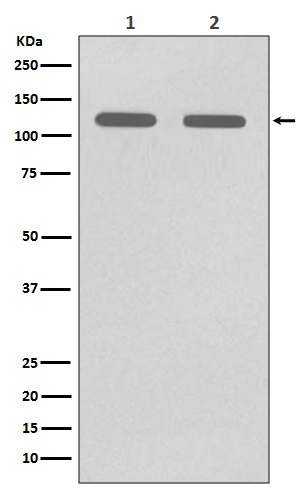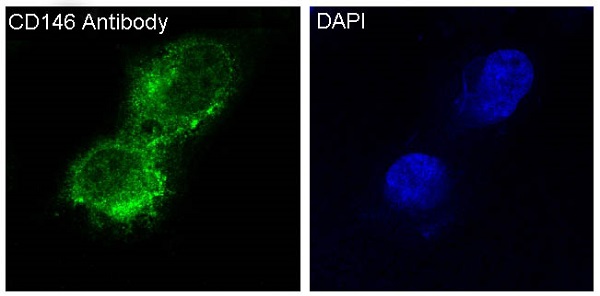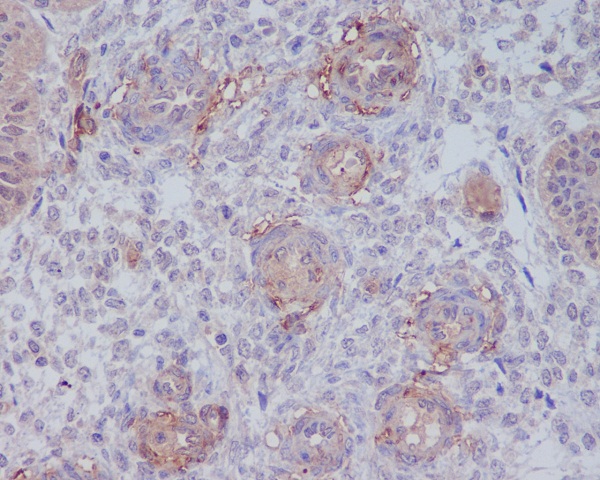


| WB | 1/500-1/1000 | Human,Mouse,Rat |
| IF | 1/20 | Human,Mouse,Rat |
| IHC | 1/50-1/100 | Human,Mouse,Rat |
| ICC | 1/50-1/200 | Human,Mouse,Rat |
| FCM | 1/50-1/100 | Human,Mouse,Rat |
| Elisa | 咨询技术 | Human,Mouse,Rat |
| Aliases | CD146; MUC18 |
| Entrez GeneID | 4162 |
| WB Predicted band size | Calculated MW: 72 kDa; Observed MW: 72 kDa |
| Host/Isotype | Rabbit IgG |
| Antibody Type | Primary antibody |
| Storage | Store at 4°C short term. Aliquot and store at -20°C long term. Avoid freeze/thaw cycles. |
| Species Reactivity | Human,Mouse,Rat |
| Immunogen | A synthesized peptide derived from human CD146 |
| Formulation | Purified antibody in PBS with 0.05% sodium azide. |
+ +
以下是3-4篇关于CD146抗体的代表性文献概览:
---
1. **文献名称**:*CD146 acts as a novel receptor for netrin-1 in promoting angiogenesis and vascular development*
**作者**:Zhong, C., et al.
**摘要**:该研究揭示了CD146作为轴突导向分子netrin-1的新受体,在血管生成中起关键作用。通过阻断CD146抗体实验,发现其抑制了netrin-1诱导的内皮细胞迁移和血管形成,为治疗血管相关疾病提供新靶点。
---
2. **文献名称**:*Targeting CD146 with a humanized monoclonal antibody blocks tumor cell migration and invasion*
**作者**:Zeng, Q., et al.
**摘要**:研究开发了一种人源化抗CD146单克隆抗体(AA98),证明其可通过抑制CD146介导的细胞黏附和信号通路,显著降低黑色素瘤和乳腺癌细胞的迁移与侵袭能力,提示其在抗肿瘤治疗中的潜力。
---
3. **文献名称**:*CD146 is a coreceptor for VEGFR-2 in tumor angiogenesis*
**作者**:Jiang, T., et al.
**摘要**:该文献发现CD146与血管内皮生长因子受体2(VEGFR-2)形成复合物,增强VEGF信号传导。使用CD146中和抗体可阻断这一相互作用,抑制肿瘤血管生成并减缓小鼠模型中肿瘤生长。
---
4. **文献名称**:*CD146 mediates VEGF-induced endothelial cell motility and connection to endothelial cells*
**作者**:Bardin, N., et al.
**摘要**:研究通过抗CD146抗体阻断实验,证明CD146在VEGF诱导的内皮细胞运动及细胞间连接中起关键作用,提示其在病理性血管增生(如癌症和视网膜病变)中的调控机制。
---
如需具体出版年份或更多文献细节,可进一步补充检索!
CD146. also known as Melanoma Cell Adhesion Molecule (MCAM) or cell surface glycoprotein MUC18. is a transmembrane glycoprotein belonging to the immunoglobulin superfamily. Initially identified as a marker for melanoma progression, CD146 has since been recognized for its diverse roles in physiological and pathological processes, including cell adhesion, migration, angiogenesis, inflammation, and immune regulation. It is expressed on endothelial cells, smooth muscle cells, activated T cells, and various cancer cells, where it participates in signaling pathways related to vascular development, leukocyte trafficking, and tumor metastasis.
CD146 antibodies are essential tools for studying its biological functions and therapeutic potential. Monoclonal antibodies targeting different epitopes of CD146 have been developed to block its interactions with ligands like laminin or Wnt proteins, thereby modulating downstream signaling. Research has explored their applications in inhibiting tumor growth, suppressing inflammatory responses, and preventing pathological angiogenesis in diseases like cancer, rheumatoid arthritis, and diabetic retinopathy. Additionally, CD146 antibodies are used diagnostically to assess vascular integrity or tumor progression in clinical samples.
Despite promising preclinical results, challenges remain in translating CD146-targeted therapies to clinical use, partly due to its context-dependent roles and complex signaling networks. Ongoing studies aim to optimize antibody specificity, evaluate safety profiles, and identify biomarkers for patient stratification. CD146 continues to be a compelling target for both mechanistic research and therapeutic development across multiple diseases.
×